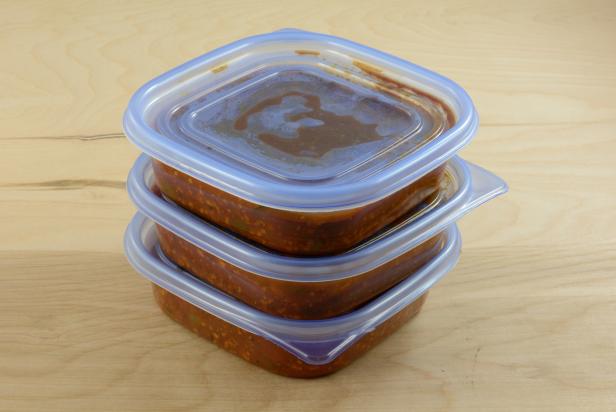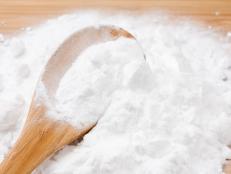How to Freeze Sauces
Have Sunday gravy any night with these freezing tips.

Merrimon / Getty Images
Get a Premium Subscription to the Food Network Kitchen App
Download Food Network Kitchen to sign up and get access to live and on-demand cooking classes, in-app grocery ordering, meal planning, an organized place to save all your recipes and much more.
By Amanda Neal for Food Network Kitchen
If you’re planning to make homemade sauces — whether classic marinara, barbecue or more —it’s easy and economical to scale up the yield. Luckily, it’s also very easy to freeze sauces. Most sauces freeze well, including tomato-based sauces, meat sauces and even creamy alfredo and bechamel sauces. Freezing is one of the easiest methods for persevering freshly made sauces in your kitchen. Before you fill your freezer with Sunday gravy, figure out details like how long your sauce will last, how to prevent freezer burn, and the best method for thawing. Whether you are meal-prepping or just looking to preserve leftover sauces, follow these tips for safe and successful sauce freezing.
Best Practices for Storing and Freezing
The first step once you’ve made your sauce is to safely cool it down. If you’ve prepared a sauce that’s already at room temperature, you can jump right into storage, but a hot or warm sauce should never go directly into the freezer because you run the risk of raising the overall temperature of your freezer. Food safety rules suggest that when cooling down food, the internal temperature should be between 120- and 70-degrees F within the first 2 hours of cooling, then 70- to 45-degrees F within the first 4 hours of cooling. To do this, you can simply leave your sauce out at room temperature for up to 2 hours, then refrigerate until cool. The other option is to place the sauce in a container, then place the entire container in a large bowl filled with ice water. Stir the sauce occasionally to expedite the cooling process. Once cool, you can then properly store and freeze your sauces.
The next step is to choose the appropriate type and size of container. Do not store sauces or any food products in glass, as they could shatter if the food inside expands as it freezes. Instead, use Tupperware, plastic containers or freezer bags. Rather than freeze in giant batches, consider how you plan to use them upon thawing, and portioning your sauces accordingly. Spoon sauce into an ice cube tray or snack-size freezer bags if you plan to use small amounts. This will not only save space in your freezer and minimize waste, it will make reheating individual portions much easier. To prevent freezer burn, simply squeeze out as much excess air as possible or use a small enough container that there’s minimal room for air to circulate.
How Long Will Sauce Last in the Freezer?
Homemade sauces will typically stay fresh in your refrigerator 3 to 4 days. Once frozen, you can safely store these same sauces for 6 months, sometimes longer. It’s important to keep in mind that once you pass the 6-month mark, your sauces are likely still safe to eat, but the flavors will have diminished and you run a greater chance of freezer burn.
How to Defrost Sauces?
The best method for thawing sauces is to slowly defrost your sauces in the refrigerator. It takes time, but will ensure that your food stays at a safe temperature. A faster method is to put the container of sauce in a large bowl in your sink. Run cold water over the container until thawed. Note: Do not use hot water for this method, which can raising the food to an unsafe temperature.
It’s also important to keep in mind that some sauces will thaw differently than others. For example, a cheesy or cream-based sauce, such as a bechamel, may break or separate once thawed. Simply whisk the sauce back together when reheating to ensure it’s no longer broken. Finally, if your sauce contains meat, it’s best to thaw the sauce in the refrigerator, then reheat to at least 165 degrees F to reduce risk of foodborne bacteria.
Though most sauces can be frozen with great thawing results, emulsified sauces, like mayonnaise or homemade vinaigrette, should not be frozen, as it’s nearly impossible to thaw properly and return the sauce to its original texture and flavor.
Now, stock that freezer with some great sauce.
Sauce Recipes That Are Great for Freezing:
Related Links
































































